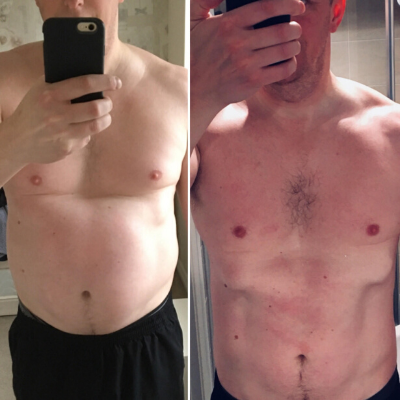How to Lose Weight Without Cutting Out your Favourite Foods
- Adam Morris
- Apr 16, 2020
- 5 min read
Losing weight is hard. You know it, I know it, pretty much the whole world knows it. And if anyone says otherwise they're either lying, delusional or a psychopath.
The number one reason why losing weight is so hard is it's something that has to be done consistently over time and that's a whole challenge in itself. The temptations and distractions might be easy to bat away for the first few days, but it's all too easy to fall off the wagon and break the diet you have been so religiously sticking to the past 48-72 hours.
But surely there must be a way to overcome this? Surely it must be possible to lose weight consistently over time and not get caught out by giving into temptation?!
Well as it so happens, yes there is! And it's all a matter of simple maths...
Maths?
First of all, let's talk about HOW we lose weight in terms of the body itself.
We've all heard about calories, right? Those pesky little things that cause you to gain weight exponentially? Well actually no, calories are simply the name for a unit of energy, the energy we use to fuel our bodies.
Just like how you put petrol in a car and it burns it as fuel, we put calories in our body and use that as fuel.
So how do we gain and lose weight?
Like it said above, it's all a matter of simple maths. If you consume/eat more calories than your body uses then that extra calories have to go somewhere and get stored as fat. If you consume/eat less calories than your body uses then those calories that the body isn't getting have to be gotten from somewhere so it uses it's own fat stores as energy. If you consume/eat the same amount of calories that your body uses then nothing happens.
Get it? Good!
Okay I understand that, but how can we apply to this to our diets for us to lose weight?
So we've established that we need to eat less calories than our bodies are using in order to lose weight (Known as being in a calorie deficit), we need to look at how we can create this.
This can be done by one of two ways, or a combination of both:
1) Reduce calorie/energy intake by cutting down on the calories we are eating.
2) Increase calorie/energy output by doing more exercise/activity.
Number one decreases the calories going in and number two increases the calories going out, therefore making it much more likely that we are going to be in a calorie deficit.
Where do we start?
First thing I always recommend to my clients is to make a food diary.
This will enable you to see what exactly you're eating and when. For the best results, keep a diary for 7 days so you can see what your habits, routines etc are for an entire week (Including the weekend!).
You can do this either by writing it down, or my favourite option is to use a great app called MyFitnessPal. This wonderful bit of tech enables us to fill out our food diary AND it tells us the calories in each food! Also you can scan the barcodes of foods which makes life so so much easier.
When we are filling out our food diary it's important to get a grasp of the amounts and portion sixes we are having so we can gain a better understanding of where our calories are coming from (You more than likely will be surprised by somethings!)
Okay so we've filled out of food diary, now how to we get in a calorie deficit?
So you've filled in your food diary (And filled it in accurately) and at this moment in time your weight will be doing one of three things:
1) Going up
2) Staying the same
3) Going down
If it's numbest one, then you are in a calorie surplus which means you're eating more calories than your body is using.
If it's number two then you're in a calorie maintenance which means you're eating the same amount of calories your body is using.
If it's number three then you're in that all important calorie deficit because you're eating less calories than your body is using.
*Please note than weight can fluctuate week on week from water levels, hormones etc, actual fat related weight loss can be determined over a few week, not a few days.
Getting in the calorie deficit
If you're reading this you're probably not in a calorie deficit, so let's talk about how to get into that. As a rule of thumb, if you subtract 20% from your current maintenance calorie intake you will have a very good amount to have you in a calorie deficit.
So now we have that amount, have a look at your food diary and decide where you can take these calories from. Ideas are:
- Reducing portion sizes (High carb foods such as potatoes, rice, chips, pasta etc are normally easy options).
- Swapping high calorie foods for low calorie, high volume foods such a vegetables.
- Swapping foods for something higher in protein.
Of course you can do this and also increase your exercise regime too, but today were focusing on food as that's where most people trip up on.
So how can I stick to this deficit without cutting out our favourite foods??
Don't worry I didn't forget about this bit (It's key to know the other stuff to understand how we can still keep in our favourite foods).
So you have your calorie deficit amount of calories and now it's time to look at how you can keep in your favourite foods.
First off, find out the amount of calories in your favourite food.
Next, take away foods from your newly adjusted food diary that total up to that amount of calories.
And hey presto, you've managed to fit in your favourite foods into your diet while still being in a calorie deficit!
So say for example you love a daily bar of chocolate that contains 250 calories. Simply take your new calorie deficit food diary and take another 250 calories worth of food away from it to account for your chocolate bar.
Take my clients Dave and Taj for example.
Both came to me looking to improve their physique's mainly through losing weight.
They both used MyFitnessPal to create a food diary then ACM Fit advised them on what steps to take to create a calorie deficit and maintain it over a period of time. The results they got were amazing and guess what - they both still managed to fit in their favourite foods into their diets.
Want to know how we got results like this while still keeping in their favourite foods AND worked around their busy work, family and social lives?
Go to https://www.acmfit.com/get-started to get more details, book a call with me (Adam) directly and discuss the best options for you.








Comments